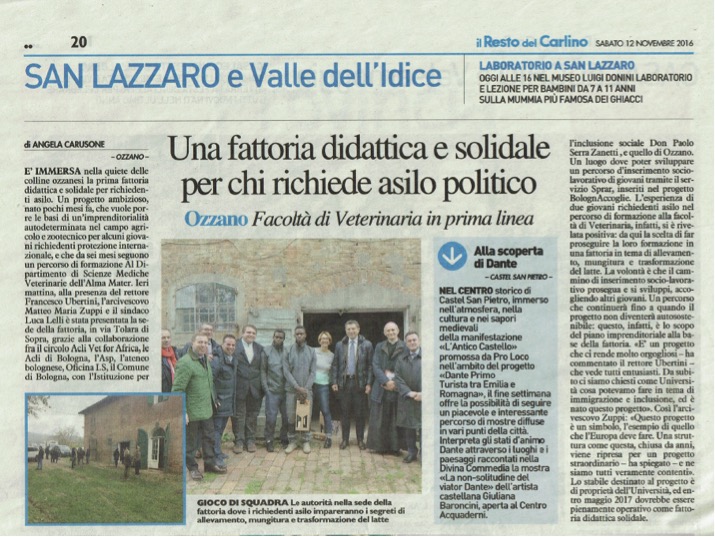Inauguration of an educational and fair-trade farm for asylum-seekers
Ozzano dell’Emilia,
November 11, 2016.
The idea was to lay the foundations for a self-determined entrepreneurship in agricultural and zootechnical fields for some young asylum seekers who have been training for six months at the Department of Veterinary Medical Sciences of Alma Mater.
The inauguration of the Social Farm in Ozzano dell’Emilia was honoured by the presence of St. Ecclesiastical Archbishop of Bologna Matteo Maria Zuppi and the Magnificent Dean of the University of Bologna, Francesco Ubertini.
The educational and fair-trade farm project is based on a close collaboration between Vet for Africa, the Acli of Bologna, the Asp City of Bologna, the Bologna University with its Department of Veterinary Medical Sciences, Oficina IS, the Grameen Italia Foundation, PerMicro, the Municipalities of Bologna (with the Institution for Social Inclusion “Don Paolo Serra Zanetti”) and of Ozzano dell’Emilia.

In particular, the idea of starting a didactic and fair-trade farm was born from the aim of laying the foundations for self-determined agricultural and zootechnical entrepreneurship for certain young international protection applicants who have been trained for six months at the Department of Veterinary Medical Sciences of Alma Mater. This wouldn’t have been possible without the exceptional personal and professional commitment of Professor Arcangelo Gentile, of the International Relations Officer, Alessandra Scagliarini, and of the Delegate to disability Professor Rabih Chattat.
The experience of young Africans has turned out to be very positive: hence, the will to continue their training in the farm, in breeding, milking and processing milk. The intention is to not let this positive socio-occupational integration path be limited to what has been done so far, but make it continue and develop with a relay mechanism, welcoming other young asylum seekers who, in turn, can be assisted by more experienced colleagues. Thanks to the commitment, on a different scale, of the partners, the training course will continue until the project becomes self-sustainable: this is the purpose of the business plan underlying the Farm.
The project’s strength is in the partnership network: everyone has believed and invested in a different way in the idea. The hope is to “export” it to other realities, offering it as a virtuous model of integration which also creates jobs and satellite activities for all the region.


